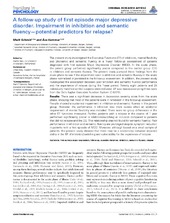| dc.contributor.author | Schmid, Marit Therese | |
| dc.date.accessioned | 2015-03-11T10:05:46Z | |
| dc.date.available | 2015-03-11T10:05:46Z | |
| dc.date.issued | 2013-09-13 | eng |
| dc.identifier.issn | 1664-042X | |
| dc.identifier.uri | https://hdl.handle.net/1956/9499 | |
| dc.description.abstract | The present study investigated the Executive Functions (EF) of inhibition, mental flexibility and phonemic and semantic fluency in a 1-year follow-up assessment of patients diagnosed with first episode Major Depressive Disorder (MDD). In the acute phase, the patient group performed significantly poorer compared to the control group (CG) in inhibition and semantic fluency. The present study pursued these findings from the acute phase to see if the impairment seen in inhibition and semantic fluency in the acute phase normalized or persisted in the follow-up assessment. In addition, the present study investigated the association between poor inhibition and semantic fluency performance and the experience of relapse during the 1-year period. Twenty eight patients and 28 individually matched control subjects were included. EF was reassessed using three tests from the Delis Kaplan Executive Function System (D-KEFS). Results : There was a significant decrease in depression severity score from the acute phase, showing that most of the patients were in remission in the follow-up assessment. Results showed a sustained impairment in inhibition and semantic fluency in the patient group. However, the performance in inhibition was more severe when an additional requirement of mental flexibility was included. There were no group differences in the other EF functions measured. Further, patients with a relapse in the course of 1 year performed significantly poorer in inhibition/switching at inclusion compared to patients that did not relapse and the CG. This relationship was not found for semantic fluency. Poor performance in inhibition and semantic fluency are prolonged despite symptom reduction in patients with a first episode of MDD. Moreover, although based on a small sample of patients, the present study showed that there may be a relationship between impaired ability in the EF of inhibition/switching and vulnerability for the experience of relapse. | en_US |
| dc.language.iso | eng | eng |
| dc.publisher | Frontiers | eng |
| dc.relation.ispartof | <a href="http://hdl.handle.net/1956/9497" target="blank">Executive Functioning in recurrent - and first episode Major Depressive Disorder: Longitudinal studies</a> | eng |
| dc.rights | Attribution CC BY | eng |
| dc.rights.uri | http://creativecommons.org/licenses/by/3.0/ | eng |
| dc.subject | first-episode major depression | eng |
| dc.subject | Follow-up | eng |
| dc.subject | executive function | eng |
| dc.subject | inhibition | eng |
| dc.subject | semantic fluency | eng |
| dc.subject | Relapse | eng |
| dc.title | A follow-up study of first episode major depressive disorder. Impairment in inhibition and semantic fluency—potential predictors for relapse? | eng |
| dc.type | Peer reviewed | |
| dc.type | Journal article | |
| dc.description.version | publishedVersion | |
| dc.rights.holder | Copyright © 2013 Schmid and Hammar. This is an open-access article distributed under the terms of the Creative Commons Attribution License (CC BY). The use, distribution or reproduction in other forums is permitted, provided the original author(s) or licensor are credited and that the original publication in this journal is cited, in accordance with accepted academic practice. No use, distribution or reproduction is permitted which does not comply with these terms. | |
| dc.source.articlenumber | 633 | |
| dc.identifier.doi | https://doi.org/10.3389/fpsyg.2013.00633 | |
| dc.identifier.cristin | 1111914 | |
| dc.source.journal | Frontiers in Psychology | |
| dc.source.40 | 4 | |

